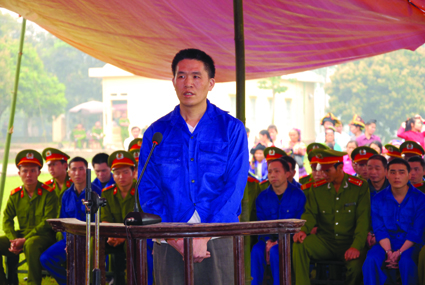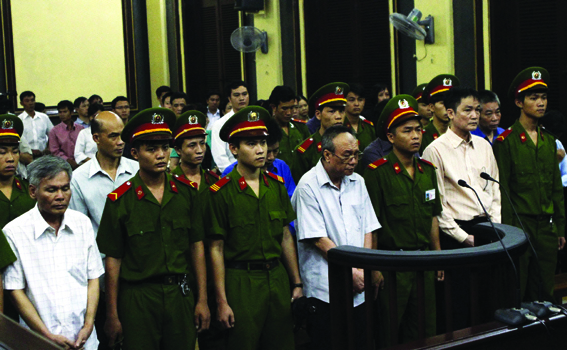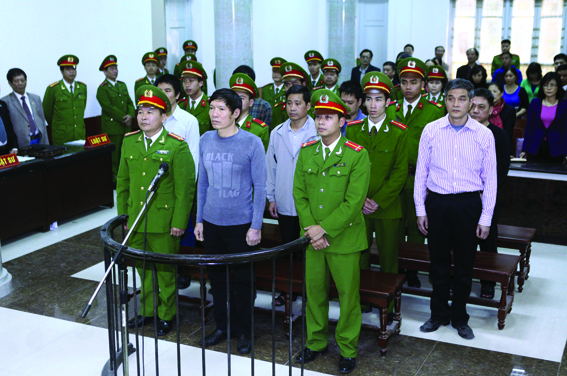Nguyen Hoa Binh, LL.D
Procurator General
Supreme People’s Procuracy
The new Constitution of Vietnam, which was passed on November 28, 2013 by the National Assembly, sets forth many important requirements on criminal justice, including more effective crime prevention and combat, protection of people’s peaceful life, respect and guarantee for human rights and citizens’ rights, and promotion of socialist democracy. These requirements should be grasped to revise the current Criminal Procedure Code (the Code) with a view to building a fair, humane, democratic and strict justice.
Examination, supervision and control of the settlement of criminal cases
Examination, supervision and control of the exercise of the state power constitute an inevitable and objective requirement to ensure that state power is properly and effectively exercised and serve as a prerequisite for maintaining the discipline and rule of law in the operations of state agencies. Lack of examination, supervision and control can lead to abuse of state power against the people’s interests. The new Constitution clearly states in Article 2: “The state power is unified and delegated to state agencies which coordinate with and control one another in the exercise of the legislative, executive and judicial powers.” This principle strengthens the grounds for the examination, supervision and control of judicial activities, especially those directly related to human rights, citizens’ rights and social order and discipline; and requires the addition of mechanisms for stricter external supervision and internal examination of procedure-conducting agencies’ performance of their functions and tasks and exercise of their powers provided by the Constitution and law.
So, the relevant provisions of the Code should be accordingly revised to enable procuracies to fully and promptly grasp all denunciations and reports on crimes and petitions for criminal case institution and strictly supervise the whole process of settlement of criminal cases by procedure-conducting agencies. New provisions should be made to improve the effectiveness of the review and examination by higher-level courts of lower-level courts’ adjudicating activities in order to promptly detect errors in their judgments and rulings. Current provisions should be revised to ensure control among procedural stages (while supervising results of previous stages, subsequent stages may exclude evidences collected by illegal methods in previous stages). The Code should prescribe procedures in a more specific and transparent manner and add the responsibility for and forms of publicizing procedural decisions to help people get easy access to justice and enhance the social supervision of criminal proceedings.
Strict control of the application of measures that limit human rights and citizens’ rights in criminal proceedings
The new Constitution establishes a new ground for better protection of human rights and citizens’ rights, affirming in Article 14 that “Human rights and citizens’ rights may not be limited unless prescribed by a law solely in case of necessity for reasons of national defense, national security, social order and safety, social morality and community well-being.” This provision means that only laws passed by the National Assembly can provide measures to limit human rights and citizens’ rights and these rights can be limited only in case of necessity for reasons specified in the Constitution. This is a very important principle showing the rule-of-law spirit and respectful attitude toward the people and prevents the abuse of power and infringement upon human rights and citizens’ rights by law enforcement agencies.
Though the criminal procedure law permits the application of deterrent and coercive measures against the accused, defendants and other procedure participants, it must be stressed that these measures may be only applied to certain subjects and only in case of necessity to facilitate the settlement of criminal cases and when all law-prescribed grounds and conditions are available.
In light of this principle, the revision of the Code should ensure that every coercive measure be strictly provided in five aspects: application grounds, competence to decide on application, application order and procedures, and application time limit. Technically, all these measures should be included in a single chapter of the Code with strict and consistent provisions to facilitate their application as well as public supervision.
In addition to the above principle, the new Constitution also prescribes more clearly the responsibility of the State to respect and protect citizens’ right to privacy and security of information and residence safety during the settlement of criminal cases. For example, Articles 21 and 22 of the Constitution stipulate that the breaking into, control or seizure of correspondence, telephone conversations, telegrams or other forms of private communication and search of homes must be prescribed by laws. To implement these provisions, all relevant regulations and guidelines on these issues should be expeditiously reviewed in order to be included in the Code or incorporated in a new law.

May 20__Photo: Doan Tan/VNA
Presumption of innocence
Presumption of innocence is a fundamental principle of every democratic justice. The new Constitution enshrines this principle in Clause 1, Article 31 as follows: “A person charged with a criminal offense shall be presumed innocent until proven guilty according to a legally established procedure and the sentence of the court takes legal effect.” This provision can be regarded as a “landmark” in Vietnam’s jurisprudential development and justice advancement. This principle aims not only to protect human rights of the accused and defendants but also to urge procedure-conducting agencies to raise their sense of responsibility and crime combat to quickly identify truths of criminal cases.
This principle prompts revision of the current provision of the Code that “No person shall be considered guilty until a court judgment on his/her criminality takes legal effect” (Article 9). More comprehensively, presumption of innocence should be institutionalized as a ground for amending relevant provisions on rights and obligations of involved parties and procedural mechanisms as follows: “A person charged with a criminal offense shall be presumed innocent until proven guilty according to a legally established procedure and the sentence of the court takes legal effect. The burden of proving a crime shall be carried by procedure-conducting agencies and the person charged with such crime has the right but has no burden to prove his/her innocence. Any doubt about his/her criminality must be presumed in his/her favor unless it is proven by methods provided by this Code.”
The right to defense
As another fundamental principle of every democratic justice, the right to defense was enshrined in all previous Constitutions of Vietnam (1946, 1959, 1980 and 1992). The 2013 Constitution introduces three important changes regarding this principle:
(i) In addition to Clause 7, Article 130 providing the guarantee for the right to defense, it makes a new provision (Clause 4, Article 31) concerning this right placed in the Chapter on Human Rights, Fundamental Rights and Obligations of Citizens. This is a progress in theoretical thinking and perception about the right to defense, which is recognized as one of the most important human rights of criminally charged persons and must be guaranteed by judicial agencies.
(ii) It widens the range of persons having the right to defense to arrestees, in addition to persons held in custody, detainees, the accused and defendants, with a view to protecting their rights and legitimate interests right in the first stage of procedure.
(iii) It specifies forms of defense, including self-defense and hire of defense counsels or other persons to provide defense.
To concretize these changes, the Code should be revised to additionally provide that arrestees have the right to defense, fully provide rights of criminally charged persons, and creates a mechanism for effectively exercising these rights. It should permit legal assistants and relatives of criminally charged persons to provide defense. It should also add cases in which appointment of defense counsels is compulsory, provide the right of defense counsels to collect and use evidences, and prescribe the responsibility of procedure-conducting agencies to assist defense counsels in collecting evidences. The defense procedures in each stage of procedure should also be specified.
Adversarial process and fair trial
A noteworthy point of the new Constitution is the recognition and guarantee of the adversarial process in trials (Clause 5, Article 103), creating a breakthrough for the renewal of the criminal procedure model in Vietnam. In criminal proceedings, both procedure-conducting agencies and procedure participants want to examine and add evidences and make arguments and counter-arguments. Therefore, the adversarial process is an objective requirement of criminal procedure, especially during court hearings. The new Constitution also adds a right of criminally charged persons to impartial and public trial (Clause 2, Article 31). The adversarial process, if properly performed, will help guarantee fair trial.
To guarantee the adversarial process and fair trial in practice, the Code should be revised to ensure that all procuracies’ requests on proving offenses and offenders be fully satisfied by investigative agencies; the accused and defendants and their defense counsels be provided with the most favorable conditions to prove their innocence or deservation of lighter penalties, and enjoy equality in collecting, weighing and using evidences and presenting their arguments. In other words, the adversarial process should be upheld in which every party has the right as well as the obligation to give arguments and judgments should be made based only on the adversarial process and evidences publicly examined at court hearings.
Prompt and timely settlement of criminal cases
The Constitution stipulates for the first time that “a person charged with a criminal offense shall be promptly tried by a court within a legally established time limit” (Clause 2, Article 31). This important requirement aims to protect the most sacred human rights such as the right to inviolability of body and the right to life.
This requirement prompts revision of the Code to ensure a necessary length of time for procedure-conducting agencies to detect crimes given their limited manpower and resources while shortening procedural time limits so as to better protect human rights and citizens’ rights. For example, the time limits for verification of crime reports, approval of decisions to institute criminal cases; delivery of procedural decisions and documents in cases involving many criminally charged persons; trial; execution of legally effective judgments and rulings; and return of case files for additional investigation, should be adjusted appropriately.
Simple procedures should be designed for less complicated cases involving clear evidences, and appropriate procedures are needed for settlement of serious and complicated cases. Summary procedures should also be made compulsory when certain conditions are met and applicable to serious crimes.
Compensation for injustice sufferers
The principle that judicial agencies conducting procedures have to take responsibility for their illegal acts and pay compensations for injustice sufferers is reaffirmed in the new Constitution, which stipulates in Clause 5, Article 31 that “A person who is illegally arrested, held in custody, temporarily detained, charged with a criminal offense, investigated, prosecuted, brought to trial or subject to judgment enforcement has the right to receive compensation for material and mental damages and restoration of honor. A person who violates the law in respect of arrest, detention, holding in custody, laying of charges, investigation, prosecution, trial or judgment enforcement, thereby causing damages to others, shall be punished in accordance with law.”
The Code should be amended to clearly define functions, tasks and powers of procedure-conducting agencies (investigative agency, procuracy, court), ensuring that each of them takes independent responsibility for its conclusions and injustice done against the innocent. The powers of investigators, procurators and judges should go hand in hand with their responsibilities in order to make them highly cautious in dealing with criminal cases. Important powers to open or close a procedural stage or limit human rights and citizens’ rights should be vested in heads of procedure-conducting agencies, while the powers to detect and investigate criminal cases should be assigned to investigators, procurators and judges.-


